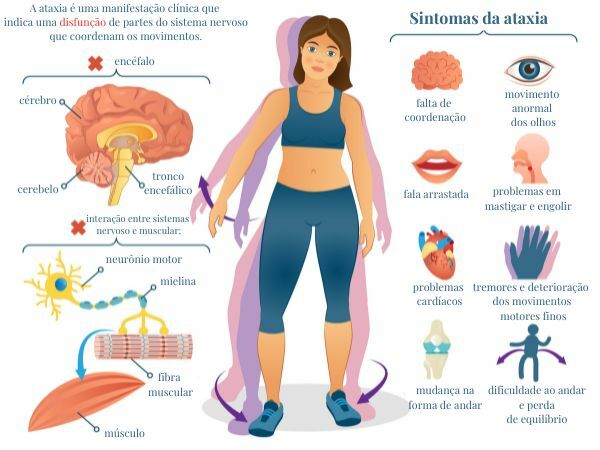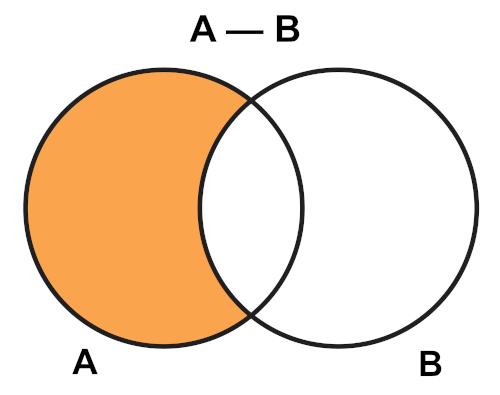A ataxia is a neurological condition caused by some nervous system dysfunction which leads to a lack of coordination of the body's voluntary movements. Ataxia can be caused by hereditary factors or by injuries or degeneration that affect the nervous system.
The types of ataxia and the way it manifests are related to its causes and symptoms, being the main symptoms are difficulty standing upright and walking, as well as performing movements accurate.
Read too: What causes dementia?
Topics in this article
- 1 - Summary of ataxia
- 2 - What is ataxia?
- 3 - What causes ataxia?
- 4 - Types of ataxia
- 5 - What are the symptoms of ataxia?
- 6 - Diagnosis of ataxia
- 7 - Treatment of ataxia
Ataxia Summary
- Ataxia is a neurological condition in which there is a lack of coordination of the body's voluntary movements.
- It is caused by a dysfunction in some part of the nervous system.
- It can occur subacutely (slowly and progressively) or acutely (over a short period of time).
- The causes of ataxia may be genetic or as a result of some other event, such as a stroke.
- In cerebellar ataxia, the symptoms of ataxia occur due to degeneration or damage to the cerebellum.
- Friedreich's ataxia is a degenerative and hereditary disease that presents ataxia as a symptom.
- Symptoms of ataxia include difficulty standing, walking, imprecise movements and tremors.
- The diagnosis of ataxia is made by a doctor based on an analysis of the patient's and family's clinical history, in addition to specific tests.
- The treatment of ataxia depends on its cause, with physiotherapy and speech therapy being important allies in controlling symptoms.
What is ataxia?
Ataxia is a neurological condition characterized bylack of coordination of voluntary body movements, among other symptoms. Ataxia itself is not a disease, but rather a set of symptoms caused by some dysfunction of the nervous system that may be due to degeneration, injury or genetic factors.
Do not stop now... There's more after the advertising ;)
What causes ataxia?
The causes of ataxia are varied and can be caused by brain dysfunction, spinal cord or of nerves. Commonly, the cerebellum is a region of the brain that, when dysfunctional, leads to ataxia.
ataxia can occur in a chronic, slow and progressive form, called subacute ataxia, or in a short period of time, when it occurs in less than 72 hours in previously healthy individuals, the so-called acute ataxia.
Acute ataxia can be caused by stroke, hemorrhage or an infection of the cerebellum. Subacute ataxia can have hereditary causes or occur due to the use of certain medications, alcohol abuse, immunological or infectious disorders. It can also arise due to a lack of vitamins, such as B1, B12 and vitamin E.
See too:What are the signs of Parkinson's disease?
Types of ataxia
There are different types of ataxia, which can be classified according to their causes and symptoms, such as cerebellar ataxia. Friedreich's ataxia, in turn, is a neurodegenerative disease that has ataxia as one of its symptoms.
- Cerebellar ataxia: is a condition in which the symptoms of ataxia are caused by some dysfunction in the cerebellum region. This may be due to cerebellar degeneration, which occurs slowly and progressively, or due to a cerebellar lesion, which occurs due to a heart attack, edema or hemorrhage.

- Friedreich's ataxia: is a neurodegenerative disease caused by a genetic alteration that leads the individual's body to produce small amounts of a protein called frataxin, which is involved in the metabolism of iron. The main symptom of Friedreich's ataxia is ataxia, which, in these cases, commonly manifests itself in difficulty walking and standing upright, slower reflexes, difficulty speaking and loss of sensitivity in the limbs.
What are the symptoms of ataxia?

Among the symptoms of ataxia are:
- difficulty balancing when standing;
- difficulty walking, which may present as:
- walk with your feet wide open;
- walking swaying or falling from side to side;
- inability to walk straight;
- constant falls due to instability when walking;
- imprecise and uncoordinated hand movements;
- tremors that become more intense when trying to reach a target, and can manifest themselves in:
- arms;
- legs;
- head;
- Whole body;
- speech problems, such as slurred speech;
- problems with eye movements;
- dizziness.
Know more:Multiple sclerosis — an autoimmune disease whose symptoms include fatigue and muscle weakness
Diagnosis of ataxia
Diagnosis of ataxia is done only by a doctor, based on an interview that will investigate the clinical history of the patient and their family members. Furthermore, the diagnosis requires detailed neurological examinations and tests, such as: imaging tests (computed tomography and magnetic resonance imaging); blood, urine and cerebrospinal fluid tests; exams to evaluate cardiac conditions; exams to evaluate eye conditions; cognitive assessment; between others.
Ataxia treatment
Treatment of ataxia occurs in different ways depending on the cause. If ataxia is triggered by the use of drugs or medications, exposure to these substances is stopped. Ataxia caused by hereditary factors can be treated with specific medications and vitamins. In cases where there is no treatment available, the physiotherapy, occupational therapy and speech therapy are important allies to reduce the intensity of symptoms and improve the patient's quality of life.
Sources
CARDOZO, D. W.; SEIXAS, F. A. v. Friedreich's ataxia: report of a case with late manifestation. Archive Science. Unipar Health, Umuarama, v. 13, no. 3, p. 243-147, Sept./Dec. 2009. Available in: https://ojs.revistasunipar.com.br/index.php/saude/article/view/3206/2244
INTERNATIONAL PARKINSON AND MOVEMENT DISORDER SOCIETY. Ataxia: essential facts for patients. Available in: https://www.movementdisorders.org/MDS-Files1/Education/Patient-Education/Ataxia/pat-Handouts-Ataxia-Portuguese-v1.pdf
INTERNATIONAL PARKINSON AND MOVEMENT DISORDER SOCIETY. Hereditary ataxias: essential acts for patients. Available in: https://www.movementdisorders.org/MDS-Files1/Education/Patient-Education/Hereditary-Ataxia/pat-Handouts-Hereditary-Ataxia-Portuguese-v1.pdf
PEDROSO, J. et al. Acute cerebellar ataxia: differential diagnosis and clinical approach. Archives of Neuro-Psychiatry, n. 77, Scielo Brazil, sea. 2019. Available in: https://www.scielo.br/j/anp/a/NKwNPtFnhDz3zWNh7Gvv7nd/abstract/?lang=pt#
Would you like to reference this text in a school or academic work? Look:
SOZZA, Nicole Fernanda. "Ataxia"; Brazil School. Available in: https://brasilescola.uol.com.br/doencas/ataxia.htm. Accessed September 15, 2023.
Check the conjugation of the verb cacimbar in all possible verb tenses.
Check the conjugation of the verb cacifar in all possible verb tenses.
Check the conjugation of the verb cacicar in all possible verb tenses.



